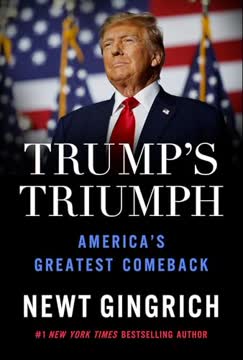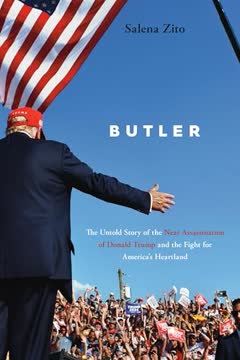Key Takeaways
1. The Butler Shooting: A Pivotal Moment
"If muskets had contained rifling—grooves inside the barrel to make a bullet travel more accurately—270 years ago, everything in the world would have changed at that moment."
A historical echo. The attempted assassination of Donald Trump in Butler, Pennsylvania, on July 13, 2024, mirrored a near-fatal incident involving George Washington in the same county 270 years prior, underscoring a peculiar historical resonance with presidential danger in the region. The author, present at the rally, vividly recounts the chaos, the sound of gunshots, and the immediate protective actions of the Secret Service, highlighting the split-second decisions that saved Trump's life. This event, occurring just before the Republican National Convention, profoundly altered the trajectory of the presidential campaign.
Divine intervention. Trump himself attributed his survival to "the hand of God," noting that his impulsive decision to turn his head to reference an immigration chart, an action he rarely performed at that point in his speeches, caused the bullet to graze his ear instead of striking him fatally. This near-death experience, witnessed by tens of thousands, became a central narrative point for his campaign, imbuing his candidacy with a sense of destiny and resilience. The incident also tragically claimed the life of Corey Comperatore, a local firefighter who shielded his family, becoming a symbol of selfless heroism.
Unprecedented calm. Despite the horrific nature of the attack, the crowd at the Butler rally exhibited an "eerily" calm response, with no panicked stampede, a phenomenon that deeply impressed Trump and surprised observers. This collective composure, coupled with the immediate outpouring of support for Trump from unexpected quarters, including some Democrats, suggested a deeper connection between the candidate and his base, one that transcended typical political divisions and hinted at a unifying, almost spiritual, dimension to his movement.
2. The Enduring Power of "Place"
"Most mainstream media reporters don’t know people like those who attend these rallies. It’s foreign to them, and they often describe them in their stories as 'strange,' 'weird,' 'uneducated,' 'far-right,' or 'left behind.'"
Rootedness defines. Butler, Pennsylvania, and similar communities across the Rust Belt, embody a profound sense of "place" – a deep connection to land, family, and tradition that shapes their worldview and political allegiances. This rootedness, often misunderstood by "placeless" elites in Washington D.C. and New York, explains why Trump's rallies resonate so strongly in these areas, as he speaks directly to the dignity of their work and their concerns about economic decline and cultural shifts. The author, whose family has lived in the region for over two centuries, highlights this generational continuity.
Economic shifts. Butler's history, from its oil boom to the rise and fall of industrial giants like Pullman Standard, reflects the broader economic struggles of the Rust Belt. The closure of the Pullman Standard railcar facility in 1980, for instance, devastated the local economy, leading to soaring unemployment and a loss of purpose. Yet, communities like Butler have shown resilience, adapting to new industries like Cleveland-Cliffs' Butler Works, which produces essential components for electrical grids, demonstrating a persistent work ethic and a desire for self-sufficiency.
A different lens. The "placed" perspective fundamentally differs from the "placeless" one, particularly on issues like climate change and globalization. While elites focus on abstract policies and global efficiencies, rooted communities consider the direct impact on their neighborhoods, jobs, and way of life. Trump's decision to hold rallies in places like Butler, often overlooked by other presidential candidates, demonstrated an understanding of this crucial dynamic, tapping into a voter base that felt ignored and disrespected by the political establishment and the media.
3. Trump's Post-Shooting Transformation
"God,' he said. 'The hand of God.'"
A new purpose. The assassination attempt profoundly impacted Donald Trump, leading him to believe in divine intervention and a renewed sense of purpose. In the immediate aftermath, he expressed deep sadness over Corey Comperatore's death and a profound sense of gratitude for his own survival, which he attributed directly to God's hand. This spiritual reflection prompted him to reconsider his approach to the campaign, shifting from a "vicious" RNC speech to one focused on unity and national healing.
Unifying rhetoric. Trump's RNC acceptance speech, delivered just days after the shooting, was markedly different from his usual combative style. He spoke of bringing the country together, healing divisions, and fighting for "all of America," not just half. He emotionally recounted the shooting, honored Comperatore as a hero, and emphasized the bravery of the crowd who stood by him. This pivot, from personal grievance to a broader message of unity and resilience, resonated deeply with his supporters and surprised many political observers.
Connecting with the "everyman." Trump's post-shooting narrative further solidified his connection with working-class Americans, whom he often referred to as "my people." His return to Butler for a second rally, and his visits to other working-class communities, reinforced his image as a leader who understood and championed the struggles of everyday citizens. This focus on the "everyman," exemplified by his tribute to Comperatore and his engagement with local communities, became a powerful counter-narrative to the media's portrayal of him.
4. The Enigmatic Shooter and Institutional Failures
"For those who didn’t know him, and perhaps some who did, the answer emerged slowly—painfully so—with gaps of missing information still apparent months later, so that we may never truly know him or what motivated his actions."
A quiet life. Thomas Crooks, the 20-year-old shooter from Bethel Park, Pennsylvania, remained an enigmatic figure, with no social media presence and a seemingly unformed political ideology despite registering as a Republican and donating to a Democratic PAC. Neighbors described him as quiet and reclusive, and his classmates were dumbfounded by the news. His isolation, exacerbated by the COVID-19 pandemic, contrasted sharply with the public nature of his final act.
A determined path. Crooks's sinister intentions appeared to solidify nearly a year before the shooting, as he joined the Clairton Sportsmen’s Club in August 2023 and spent an unusual amount of time practicing rifle skills, even on holidays like Christmas and Valentine's Day. This dedication to honing his marksmanship, coupled with the discovery of explosive devices and a tactical vest in his car, indicated a meticulously planned attack, despite authorities finding no evidence of mental health issues or external assistance.
Secret Service lapses. A bipartisan US House Task Force report, chaired by Butler County Congressman Mike Kelly, revealed significant failures by the Secret Service that contributed to the assassination attempt. The report highlighted:
- Failure to secure the American Glass Research (AGR) complex adjacent to the venue, which offered clear sight lines to the stage.
- Lack of clear guidance to state and local law enforcement regarding responsibility for the unsecured area.
- Insufficient monitoring and patrolling of the AGR property.
- Breakdowns in communication and technology that hindered intervention.
- Inexperienced Secret Service personnel in key advance planning roles.
These systemic issues allowed Crooks to evade detection and carry out his attack, leading to a "reckoning" for the institution.
5. The Expanding Conservative Populist Coalition
"The people had not changed, but the Republican and Democratic Parties had changed, especially the Democratic Party, which lobbed off people like the Browns and the Kopers in favor of being the party of the ascendant."
A shifting landscape. The 2024 election cycle revealed a significant expansion of the conservative populist coalition, drawing in working-class voters of all races, including former lifelong Democrats. Figures like Erin Koper, a former Obama voter from a working-class Pittsburgh family, exemplify this shift, driven by concerns over economic hardship, rising crime, and a perceived disconnect from the Democratic Party's priorities. Her RNC speech, focusing on law and order in Pittsburgh, resonated with many who felt their communities were being neglected.
Beyond stereotypes. This new coalition defied traditional media stereotypes, encompassing a diverse range of individuals: union workers, nurses, janitors, small business owners, and college students. They were united not just by support for Trump, but by a shared sense of identity and a desire for a government that addressed their tangible concerns. The author observed a palpable "revival mode" among these voters, who were no longer afraid to openly display their support for Trump, even in traditionally hostile territories.
A new identity. For many, leaving the Democratic Party felt akin to leaving the Catholic Church, a profound shift in identity. However, they found a new home in the Republican Party, which, under Trump, embraced their values of hard work, patriotism, and community. This tectonic shift, often overlooked by national media, was evident in the growing number of Trump signs in unexpected neighborhoods and the enthusiastic turnout at rallies, signaling a fundamental realignment of the American electorate.
6. Kamala Harris's Campaign: A Study in Disconnect
"Am I crazy? I feel like I am,” I said. “They did nothing to win over new voters. They took zero risks and even put themselves in places that could have backlash.”
Controlled narrative. Kamala Harris's campaign, particularly in crucial swing states like Pennsylvania, was characterized by tightly controlled, invite-only events, often held in remote locations or private venues. This strategy, aimed at avoiding protests and maintaining a flawless image, inadvertently created a significant disconnect with the very voters she needed to win. The author's frustration in trying to locate public events highlighted the campaign's reluctance to engage with the broader electorate or local press.
Tone-deaf optics. Harris's campaign made several missteps that alienated working-class voters. Her bus tour, for instance, was a "thirty-four-mile loop" with staged stops at local icons like Primanti Bros. and Sheetz, where regular patrons were cleared out or the company was simultaneously being sued by the Biden-Harris administration. These actions were perceived as inauthentic and hypocritical, reinforcing the notion that the campaign was out of touch with the everyday realities and cultural touchstones of the region.
A "blank canvas" strategy. While the Trump campaign actively defined Harris as "dangerously liberal" through targeted ads and consistent messaging, the Harris campaign struggled to define itself, running numerous "creatives" in search of a message that would stick. This lack of a clear, compelling narrative, coupled with her perceived evasiveness on key issues like fracking and border security, allowed the Trump campaign to effectively paint her as a "blank canvas" upon which they could project their desired image, further hindering her ability to gain momentum.
7. J.D. Vance: The Relatable Son of Appalachia
"His success was in part, because Vance is a child of Appalachia who enlisted in the Marine Corps, went on to achieve great success among the elites, then returned to his roots to raise his family."
Authentic connection. J.D. Vance, the Republican Vice-Presidential nominee, resonated deeply with working-class voters due to his authentic Appalachian background and personal story of overcoming adversity. His memoir, Hillbilly Elegy, provided a "decoder" for understanding the struggles of the Rust Belt, and his ability to connect with voters on issues like addiction, economic decline, and the dignity of work made him a powerful voice for the Trump campaign. He embodied the American dream, rising from a dysfunctional family to a Yale graduate and U.S. Senator.
Direct engagement. Unlike the Harris campaign, Vance consistently engaged with the press, even when facing hostile questions about past controversial remarks like his "childless cat ladies" comment. He used these opportunities to pivot to issues that mattered to voters—the border, the economy, and the fentanyl crisis—demonstrating a willingness to confront criticism directly and articulate his policy positions. This approach contrasted sharply with the tightly controlled media strategy of the Democratic ticket.
A powerful counterpoint. Vance's selection as Trump's running mate provided a strategic counterpoint to the Harris-Walz ticket. While Walz attempted to portray himself as the "true small-town guy," Vance's lived experience and his mother's public journey of recovery from addiction offered a more compelling and relatable narrative for many working-class families. His ability to deliver sharp critiques of the opposition with a polite demeanor made him an effective "attack dog" for the Trump team, further solidifying the conservative populist coalition.
8. Media Bias and the Erosion of Trust
"The press had become bored with and ultimately dismissive of places that once prospered, and the people who made them thrive, by the time the 2024 election cycle began."
A widening chasm. The 2024 election cycle starkly exposed the deep chasm between the mainstream media and a significant portion of the American electorate, particularly those in "rooted" communities. Journalists, largely concentrated in wealthy urban centers, often failed to understand or accurately portray the values and concerns of working-class voters, resorting to condescending labels like "strange," "weird," or "racist." This disconnect led to reporting that felt alienating and biased to many.
Death by a thousand cuts. The erosion of trust in national news organizations was a cumulative process, exacerbated by:
- A focus on "narrative-shaping" over objective reporting.
- The hollowing out of local news, leaving many communities without culturally connected journalists.
- The prioritization of online clicks and provocative headlines over thorough, nuanced reporting.
- A perceived lack of accountability for inaccurate or biased stories.
- The dismissal of voter concerns as "grievances" or "resentment."
A self-inflicted wound. The media's consistent negative framing of Donald Trump, coupled with what the author describes as "gaslighting" about Kamala Harris's popularity, further damaged their credibility. Instances like the misreporting of crime statistics or the downplaying of Biden's "garbage" remark highlighted a willingness to prioritize a political agenda over factual accuracy. This self-inflicted wound, as noted by industry veterans like Carl Cannon, has led to a historic low in public trust in the news media, prompting a "reckoning" for the profession.
9. The "Garbage" Gaffe and its Unintended Consequences
"After years of being referred to as bitter, clinging to their guns and Bibles, irredeemable deplorables, racists, and extremists, everybody with whom I spoke believed that Biden meant it the way it sounded—and nobody was surprised by it."
A defining moment. President Joe Biden's off-the-cuff remark calling Trump supporters "garbage" on a Zoom call became a pivotal moment in the campaign, instantly galvanizing Trump's base and reinforcing their long-held belief that the Democratic Party and its allies in the media held them in contempt. This comment, made just as Kamala Harris was attempting to launch her unifying campaign, overshadowed her efforts and became a powerful symbol of perceived elitist disdain.
Unintended consequences. Despite attempts by national political reporters to claim the quote was "taken out of context" or that Biden "didn't really say what he said," the remark resonated negatively with voters across the country. Trump supporters, already accustomed to being labeled with various pejoratives, embraced the "garbage" moniker with defiant humor, even placing Trump signs on their garbage cans and wearing "garbage" themed costumes for Halloween. This reaction demonstrated a deep-seated weariness with being lectured and dismissed by political and cultural elites.
Fueling the fire. The media's efforts to cover for Biden's gaffe further eroded their own credibility, as voters observed a clear double standard in how similar remarks from Trump were treated. This incident, combined with the ongoing "fascist" narrative against Trump, inadvertently strengthened the bond between Trump and his supporters, who felt increasingly validated in their perception that the establishment was actively working against them. The "garbage" comment became a rallying cry, solidifying the conservative populist coalition's resolve.
10. The Reckoning: Institutions on Notice
"There will be a reckoning for our institutions and that includes our press. Sorry, Salena,” he said. I’m good with that; I get it. “There has to be,” he continued. “They have all failed us."
A crisis of confidence. The 2024 election results, coupled with the findings of the Secret Service's failures in the Butler shooting, signaled a profound "reckoning" for American institutions, particularly the press. Congressman Mike Kelly, whose constituent Corey Comperatore died in the attack, articulated a widespread sentiment: voters had lost confidence in institutions that had failed to live up to their missions. This wasn't resentment, but a demand for accountability and a return to core principles.
Media's self-inflicted wounds. The decline in public trust in the news media, a trend evident since the 1970s, accelerated in 2024 due to:
- A lack of geographic and ideological diversity in newsrooms.
- The prioritization of partisan narratives over unbiased reporting.
- The dismissal of voter concerns and the use of condescending language.
- The failure to adapt to changing media consumption habits, particularly the rise of podcasts and alternative news sources.
- The perception that journalists behaved more like activists than objective observers.
The tide has turned. The election demonstrated that the "mainstream media's dominance in narrative- and reality-shaping" had shattered. Tech leaders like Mark Zuckerberg and Jeff Bezos publicly acknowledged and acted on the issue of media bias, further highlighting the industry's self-inflicted wounds. The rise of platforms like Joe Rogan's podcast, which offered unfiltered interviews to millions, underscored that voters were actively seeking alternative sources of information, bypassing traditional gatekeepers and signaling a fundamental shift in how Americans consume and trust news.
Last updated:
Review Summary
Butler is a controversial book about Trump's 2024 campaign and an assassination attempt. Supporters praise Zito's insight into rural America and Trump's appeal, while critics call it propaganda. Many reviewers appreciate Zito's journalism style, focusing on real people in middle America. The book explores why Trump won in 2024, the media's failings, and the Democratic party's disconnect from working-class voters. Some readers found it eye-opening, while others saw it as biased. Overall, it's a polarizing work that reflects the divided political landscape.
Similar Books







Download PDF
Download EPUB
.epub digital book format is ideal for reading ebooks on phones, tablets, and e-readers.




